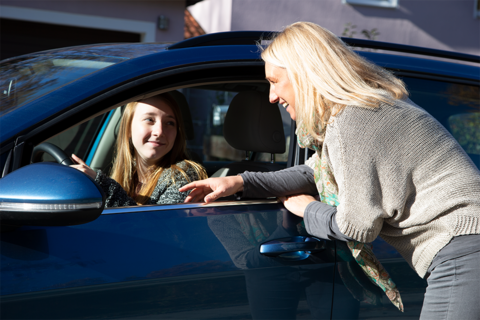Driving abroad
With these tips nothing goes wrong on holiday
Your next holiday trip is planned by car? We have put together a number of tips for you to follow when driving abroad. Also read which points you should clarify in advance during your holiday preparation.

Validity of the driving licence
As your driving licence is issued in one EU country, you can use it anywhere in the EU. Make sure, however, that your driver's license is still valid. You may not drive in another country with a provisional driving licence or certificate. The following categories of driving licences are recognised throughout Europe: AM, A1, A2, A, B, BE, B1, C1, C1E, C, CE, D1, D1E, D and DE.

Special feature "Accompanied driving from 17" (BF17)
In the beginning the driving licence was only valid within Germany. Meanwhile you are allowed to drive a car in Austria under compliance with the German accompanying regulations. However, make sure you check this with your liability insurance beforehand.
Observe minimum age
The minimum ages in the driving licence categories vary within Europe to some extent. In Italy, for example, the minimum age for a moped driving licence is 14, in Belgium 16. So an Italian youth has to wait until he is 16 years old before he can ride a moped in Belgium.
Driving licence lost abroad
If you lose your driver's license abroad or it is stolen, you should report the loss immediately to the police station and the consulate or embassy. The consulate then contacts the German authority and the police can issue a provisional document. This allows you to travel in the affected country for a limited period of time. If you travel through several countries, you must repeat this procedure in each country. Back in Germany you have to apply for a substitute driving licence.

Validity of car insurance
As a general rule, your car insurance policy issued in Germany covers personal injuries caused by you throughout the EU. If you travel with a trailer, you must also have insured this one. In some EU countries your trailer must be covered by your own insurance. It is therefore best to check with your insurer in advance. Always take the insurance documents with you in your holiday luggage.
Traffic rules abroad
Some rules apply throughout the EU, some rules vary from country to country. It is always best to find out the exact traffic rules before departure, e.g. with the ADAC or with the app „Im EU-Ausland“ of the European Union.
This applies throughout the EU:
- Strap duty. This also applies to coaches and minibuses.
- Children must always travel in suitable child seats.
- In almost all EU countries, calls may only be made using a hands-free car kit.
This is where the countries differ:
- In the blood-alcohol limits. In some countries there is a zero-alcohol level.
- In the maximum speeds
- In the safety equipment (e.g.: safety vest)
- In some countries daytime running lights are mandatory.
- In some countries winter tyres are mandatory.
- Some countries have left-hand traffic (Great Britain, Ireland/Northern Ireland, Malta and Cyprus).
- In the fines
- In addition, there are different import and export regulations in the individual countries.
- Also find out about the road tolls (toll, vignette, etc.) of the individual countries.


Find your driving school
Of course, you can also get even more tips about driving at first hand in your driving school. You haven't decided on one yet? Then have a look at our search and discover driving schools near you.